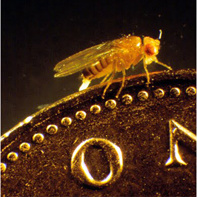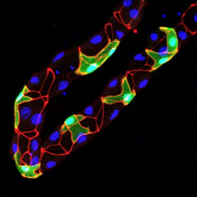PhD students participating in August Krogh seminars receive 0,2 ECTS per seminar
AKC Seminar: Adventures in comparative physiology and genomics: Fruit flies, kidney stones and metabolomics
August Krogh Seminar
Professor Julian Dow
Institute of Molecular Cell and Systems Biology, University of Glasgow.
Although there are homologs for over 70% of human genes in Drosophila, the best disease models are organotypic - that is, when the fly homolog is expressed in the most appropriate tissue for the disease. Our FlyAtlas.org online expression resource allows researchers to identify such candidate gene/tissue pairings.

Fly on coin. Photo: Julian Dow
Of such tissues, the Malpighian tubule provides an excellent model for renal function and disease; it transports fluid faster (on a per cell basis) than any other transporting epithelium, and its transport and signaling pathways are uniquely well understood.
Nephrolithiasis represents a major health burden, costing over $5B/ yr in the US alone. Insect Malpighian tubules in fact express two major classes of stone (phosphate and urate) constitutively, and the rosy mutant exactly recapitulates the renal & metabolic phenotypes of human xanthinuria type I.
The most common stones in humans are of calcium oxalate, with a complex etiology including a dietary component, and here we show that dietary oxalate loading rapidly induces stones in Drosophila tubules. Furthermore, stone formation in isolated tubules can be induced in minutes by addition of oxalate, allowing the nucleation event to be monitored in situ for the first time.

Septate junctions (red), stellate cells (green),
nuclei (blue). Photo: Pablo Cabrero
The utility of the model would be increased if specific genes could be associated with stone formation. We have identified prestin, an SLC26A5/6 homolog with strong expression in the gut and tubules, as a key oxalate transporter that mediates stone formation, as dsRNA-mediated knockdown of prestin in just tubule principal cells is sufficient to reduce the rate of stone formation. Given the range of quantitative phenotypic readouts available in this tissue, it is clear that the Malpighian tubule offers an unusually good model for human function and disease.
Read more about Dow / Davies labs.
Time
Friday 29 June 2012 13:00-15:00
Venue
Auditorium 1, August Krogh Building, Universitetsparken 13, DK-2100 Copenhagen
Registration
Participation is free, but please register here.
For PhD students
PhD students participating in August Krogh seminars receive 0,2 ECTS per seminar
Contact
Christian Frøsig
